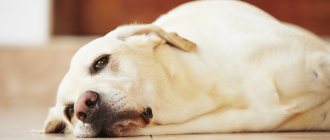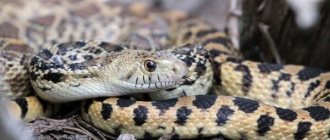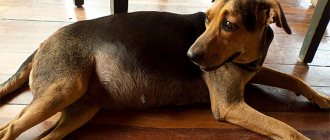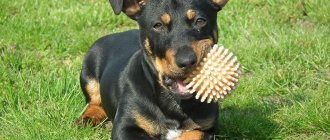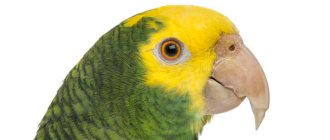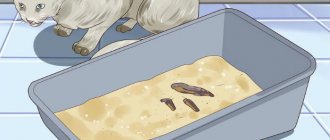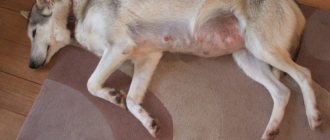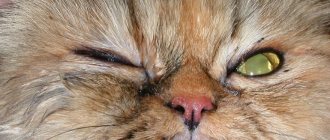What is hiccups in dogs? This reaction of the body brings discomfort to your four-legged friend and quite frightens the owners. You cannot advise your pet to hold his breath; he physiologically does not know how to control such a process. In most cases, this effect does not pose a threat to the student. The main factor behind hiccups is compression of the diaphragm. The causes of hiccups in dogs can be simple stress, fear or rapid consumption of food. Sometimes this reaction appears in the morning, after sleep. Let's look at more detailed conditions, why does the dog hiccup?
The main causes of hiccups in puppies
Especially at an early age, doggies often suffer from hiccups. With age, such attacks noticeably decrease. Doctors even call puppy hiccups a specific “growing disease.” Yes, for most children, such a reaction is not a source of concern, but you need to watch the child. If it continues for more than an hour, then it’s time to consult a veterinarian. There are really plenty of reasons why puppies hiccup:
- High activity.
- Excessive appetite, when a puppy quickly eats food, he swallows air, which, in turn, causes a spasm of the diaphragm.
- Dry food.
- Hypothermia.
- Heat.
- Psychological factors: fear, anxiety, stress, etc.
- Pinched nerve endings.
- The little ones have not yet developed the alimentary tract - this is a kind of adaptation to the environment.
Such manifestations do not pose a threat to the life of dogs, but there are factors that are dangerous for young and older organisms:
- Pathology of the gastrointestinal tract.
- A foreign body in the stomach that was swallowed by a playful animal.
- Injury.
- Heart diseases.
- All kinds of parasites.
You can help your child get rid of discomfort with a tummy massage. Walking with moderate activity has a beneficial effect. It is very important that if the manifestations are more serious, prolonged, and even accompanied by other symptoms, this is a reason to contact the clinic as soon as possible.
Is it dangerous
Hiccups themselves, as a physiological reaction, do not pose a danger to the life of the animal . The degree of danger of an attack for a dog is determined by how serious its causes are.
If the disorder is episodic in nature, the attacks last a short time and go away on their own, then there is no reason to worry. This is a natural reaction of the body to one or another external irritation.
If hiccups continue for a long time, attacks are repeated daily, accompanied by other alarming symptoms, then you need to look for internal pathology, which is the cause of sudden spasms of the diaphragm. It is necessary to take the animal to a veterinary clinic as soon as possible for professional diagnostics.
After identifying the primary disease, treatment will be prescribed that will help eliminate not only the symptom, but also its cause.
Causes and types of hiccups in dogs
The dog hiccups reasons why this happens? Just like in cubs, the adult body reacts to various factors: hypothermia, overeating, overexertion, etc. Hiccups are divided into safe (natural, short) and dangerous (long).
Causes of natural hiccups in dogs
- during sleep, sometimes the body presses on the diaphragm;
- anxiety, fear;
- after eating, quickly absorbing food, or food cut into large pieces - all this leads to irritation of the gastrointestinal system;
- manifestation of pregnancy;
- swallowing air;
- sudden awakening after sleep;
- drying out of the nasopharynx, etc.
Hypothermia
Hiccups are a common reaction to hypothermia. In cold, drafty conditions, the muscles of animals tense to retain heat. The visible manifestation of a chilled animal is hiccups. Pets with short hair and smooth coats suffer more from cold weather. Or if the dog is very small, decorative. For example: Yorkies, Pekingese, Dachshunds, Chihuahuas, Beagles, Corso, etc. The owner of such a “creature” often buys all kinds of outfits for his pupils. In order to protect the body from all kinds of hypothermia. In cold weather, such breeds have less walking time. Frost is less dangerous for dogs that are specially bred for cold weather, rescue operations, and protection, but they can also have a manifestation for various reasons. For example: Labrador, German Shepherd, Laika...
Is it possible to ignore hiccups?
A short-term reaction will not harm your pet, but a long-term, constant reaction may indicate health problems. Visually, everything is fine with the dog, but it continues to periodically hiccup; this may be a consequence of the following diseases:
- Pathologies of the central nervous system. In addition, the four-legged dog exhibits additional symptoms: tremors of the limbs, loss of coordination, and inability to concentrate the pet.
- Respiratory problems. Added: rapid breathing, cough, snoring.
- Gastrointestinal diseases. Indigestion, diarrhea, flatulence, etc. The dog also licks his lips and tries to vomit.
- Heart diseases. Perhaps even a pre-stroke or pre-infarction condition, if the hiccups do not stop within two hours.
Additional Information
. If your pet licks the floor and hiccups, this is a clear sign of a stomach problem.
The child does not sleep well at night, the child grinds his teeth (bruxism): a behavioral feature or a disease?
Getting a full night and daytime sleep every day is a very important condition for the development of mental functions of a preschool child. If your child begins to have trouble falling asleep and wakes up frequently, you should take this as carefully as possible. We are engaged in restoring normal sleep in children. Correction or treatment depends on the causes of sleep difficulties and is determined during a consultation or after a scheduled examination, if necessary.
How long should a child sleep?
| Child's age | Daytime sleep duration | Night sleep duration |
| 1 to 2 months | about 9 o'clock | around 18 o'clock |
| 3 to 4 months | about 8-6 hours | about 16 o'clock |
| 7 to 9 months | about 4 hours | about 13 o'clock |
| 10 to 12 months | about 3 hours | about 13 o'clock |
| From 1 to 1.5 years | about 3 hours | about 12 hours |
| From 1.5 to 2 years | about 2.5 hours | around 10-11 o'clock |
| From 2 to 3 years | about 2.5 – 2 hours | around 10-11 o'clock |
| From 3 to 7 years | about 1.5 hours, optional | about 10 o'clock |
| After 7 years | Daytime naps are not necessary | at least 8-9 hours |
Sleeping mode
. A child's normal sleep should proceed without interruption, without episodes of agitation associated with screaming or crying during sleep. The normal duration of falling asleep is about half an hour; if it lasts more than 30 minutes, you should pay attention to this and find out the reason. It is normal for a child to wake up early on weekends according to the routine adopted on weekdays. It is desirable that the biorhythm of the child’s life coincides with the biorhythm of the geographical time zone in which he lives. It is provided in nature that when it is dark outside, a person sleeps, and at dawn he wakes up, the same rhythm corresponds to the children's regime. For a preschooler, lights out should be no later than 10 p.m. It is not always possible for schoolchildren to maintain such a regime, because the load received at school increases disproportionately to the physiological capabilities of the children. But still, for the harmonious growth and development of a child, it is necessary to strive to adhere to the regime and have at least 8-9 hours of sleep. For a child under 10 years old, a sleep duration of 9-10 hours is absolutely normal and healthy.
Many children approaching school age refuse to sleep during the day; this is not always a violation of their sleep patterns; for some children, with a full night's sleep, the need for daytime sleep disappears. Provided that the lack of daytime sleep does not entail a change in the child’s well-being for the worse. One more aspect must be taken into account that for children under 4 years of age, daytime sleep is vital, since during this period of life the neural structure of the brain is actively being built and good sleep contributes to the most efficient functioning of the brain in the future.
Sleep consists of several stages (divided into phases). Complete rest, restoration of the nervous system, active metabolism and immunity occur mainly in the third and fourth phases of sleep. These phases are achieved only in night sleep, subject to timely falling asleep, sufficient duration and depth of sleep, and the absence of night awakenings.
A situation where a child does not sleep at night or
has difficulty falling asleep for a long time, often gets up, asks for something to drink or eat, or invents different activities for himself just to stay awake, can arise for many reasons.
Main reasons :
- increased intracranial pressure (ICP);
- increased level of anxiety;
- a stressful situation or excessive nervous tension in response to something;
- neurosis;
- excessive workload of the child at school;
- increased convulsive readiness of the cerebral cortex (recorded on the EEG);
- pain in the abdomen or other area of the body, itching, worms.
Behavioral factor.
It arises due to the attention deficit of adults who work all day and come home late, without devoting enough time to their child. As a result, the child falls asleep for a long time, because he wants to make up for the lack of communication with his parents and feel their physical and emotional presence next to him.
High level of anxiety in a child.
When a child cannot fall asleep, but having difficulty falling asleep, he often wakes up or sleeps shallowly, as the stress mechanisms of the nervous system continue to work, including defensive reactions and not allowing the child to fall asleep deeply.
The child screams in his sleep, walks, talks in his sleep.
Sleepwalking (somnambulism) is a state of incomplete awakening. At the time when the child should enter the deep stage of sleep, the process of brain inhibition occurs, but the process does not affect all areas of the brain, i.e. part of the brain remains awake or wakes up in the middle of the night. As a result, the child can sit up in bed, stand up, walk, scream, express emotions and even talk without waking up. Sleepwalking in children is usually quite treatable.
The child grinds his teeth in his sleep
. The main age when bruxism occurs is the period from 3 to 6 years. The peak of manifestation occurs at the age of five, when molars begin to erupt. The cause of teeth grinding can be difficulty breathing due to adenoids, ear or toothache and nasal congestion, abdominal pain and, in general, any physical discomfort.
Lack of adequate sleep can lead to serious problems for a child’s body. Such as a disorder of the nervous system, weakening of the immune system, disruption of the body’s usual mode of operation of all internal organs. It is necessary to treat your child's sleep as carefully as possible. Restoring normal night sleep in a child is, as a rule, a completely doable task.
treating a child who is not sleeping well first.
:
- Consultation with a pediatric neurologist. Typically, during the consultation, the cause of the sleep disorder will be clarified and treatment can be selected.
- If there are suspicions about chronic night pain anywhere, skin itching, nasal breathing problems, we will offer help from a doctor of the appropriate profile.
Long-term hiccups are a sign of disease
The previous section revealed what diseases frequent hiccups can cause. But in addition to various pathological symptoms, it can be a sign of various damage from external sources:
- There is a foreign object in the stomach. Just like puppies, adults can be very curious, which leads to them exploring things around them.
- Worms. If this is the reason, you can see parasites in the burp.
- Trauma to the body. There may be visual symptoms of bruises, etc.
- It can start if your little brother suddenly jumps up and runs after sleeping or resting. After waking up, the dog may often have a warm nose. Choleric dogs, due to their irrepressible nature, experience prolonged or periodic hiccups. This manifestation is not dangerous; it characterizes the energetic character of the pet more.
The reasons why a dog often hiccups can be very serious. This reaction is a consequence of internal or external negative factors. Timely treatment is the key to your friend’s health.
Prevention
After eating, the dog should drink enough water. It is not advisable to cut meat into too large pieces, because a hungry animal can quickly swallow food without sufficient chewing, which will lead to unpleasant consequences.
Read Adenoma of the eye (third eyelid) in dogs: causes, treatment and prevention
Avoid excessive activity, let the dog periodically rest and recuperate. It is also important that your pet sees a veterinarian regularly for checkups.
Hiccups cause a lot of concern among owners, but in most cases they go away within a few minutes. It is important to take into account the duration and frequency of this phenomenon in a dog in order to identify the disease in time and relieve the pet of unpleasant sensations.
What to do with short and long-term hiccups: when to contact a veterinarian
With a short (non-dangerous) manifestation, you need to find the root cause of the occurrence, then take action:
- If the phenomenon is caused by overeating, you can give your dog warm water, massage his belly, or give him a piece of sugar.
- Try to dance with your pet; air will come out when he burps.
- If hypothermia occurs, the best medicine is to warm the animal.
- You can also distract your four-legged dog by playing or running.
Important to remember
– long-term manifestation may indicate various diseases. Therefore, the best way to protect your “companion” is the services of a veterinarian. Often, during long attacks, drugs are prescribed: metoclopramide, seduxen, etaprazine, aminazine, etc.
How to help
The owner can independently help the pet only if it is known that the dog is healthy and hiccups are a natural reaction of the body.
Simple measures will help eliminate the factors that provoke the attack, and, therefore, speed up its completion:
- It is necessary to monitor how the ward takes food. It is useful to encourage him to eat more slowly by placing a bowl of clean water next to the food . If hiccups do start, you should gently massage your stomach, give you a drink of warm water, and distract you with a piece of sugar or a cookie.
- If the dog swallows some air along with food, it should be removed from the stomach. To do this, put the dog on its hind legs and hold it in an upright position until the air burps.
- If the hiccups are associated with hypothermia, you should immediately warm the dog, thereby eliminating the risk of a cold.
- During an attack, it is useful to distract the dog by offering to play. A walk in the fresh air will help change the breathing rhythm, which will also help the hiccups end as quickly as possible.
- Frequently recurring attacks often indicate that the dog is infected with worms. To eliminate this provoking factor, regular deworming should be carried out. In childhood, the procedure is carried out regularly every 3 months, in young animals and adult dogs - every six months.
What to do if hiccups don't stop?
If home attempts to stop hiccups are unsuccessful, you should take the animal to the veterinarian as soon as possible.
The doctor may determine that the attacks are caused by instability of the nervous system, a violent reaction to a stressful situation, or fear. In this case, sedative drug therapy has a good effect.
As prescribed by the doctor, the owner will be able to independently treat the pet with medications that reduce anxiety levels and reduce the reaction to stress.
Typically, in such cases, injections of the following medications are prescribed:
- Cerucal. This drug has an antiemetic and antihiccup effect, improves the quality of digestion, and eliminates the reflux of gastric juice into the esophagus.
- Seduxen. A tranquilizer, has a sedative-hypnotic effect, relieves muscle spasms, treats stress and stress-like conditions, and increased anxiety.
- Aminazine. Neuroleptic with a strong sedative effect. Relieves psychomotor agitation, reduces anxiety and stress response. The drug has a side effect - a strong hypnotic effect.
